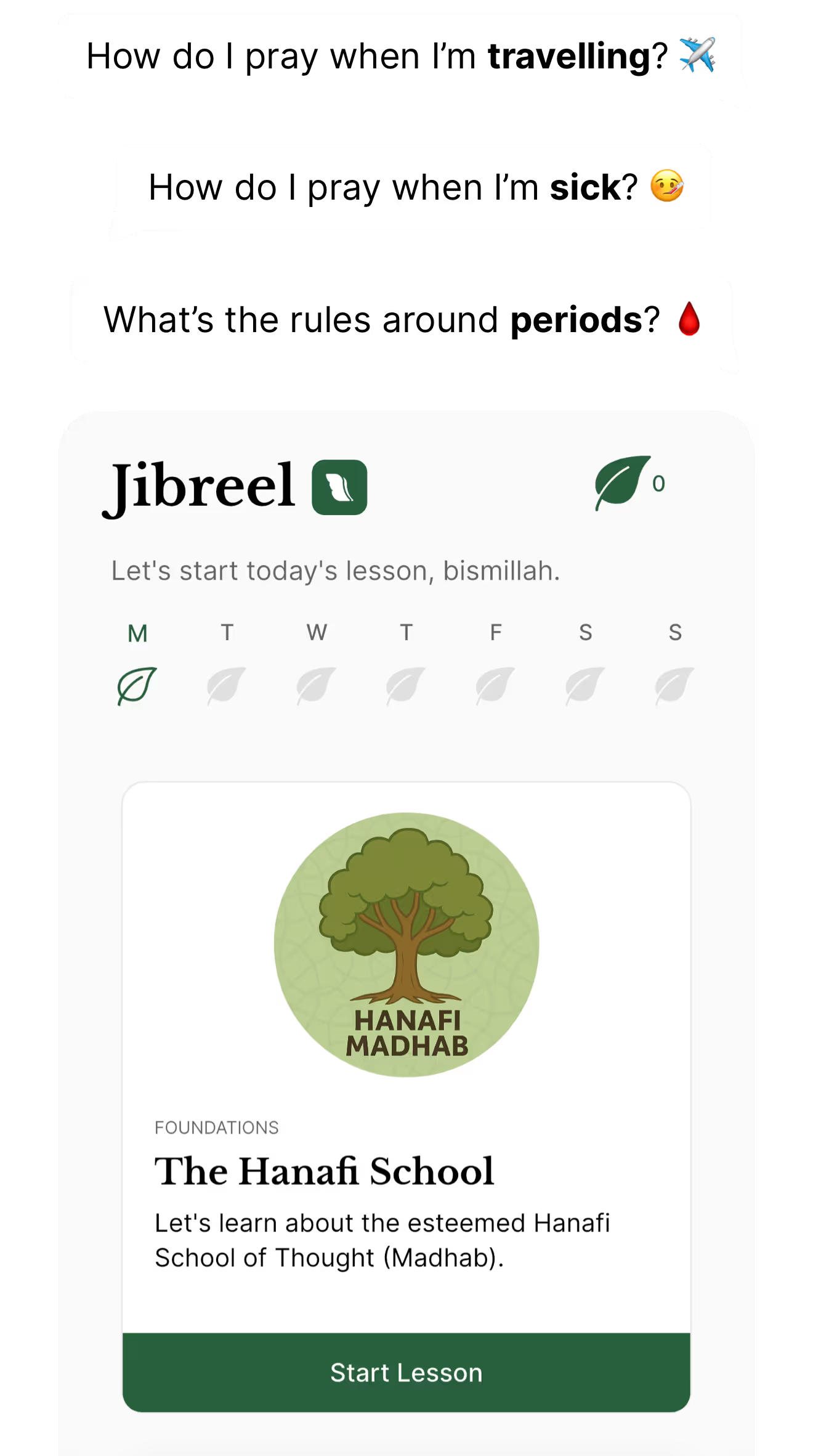The Hadith of Jibril (Full Text): The Hadith Behind the 6 Pillars of Iman
Full Hadith (Jibril/Gabriel) — narrated by ʿUmar ibn al-Khaṭṭāb RA
While we were sitting with the Messenger of Allah (peace and blessings be upon him), a man appeared whose clothes were exceedingly white and whose hair was exceedingly black. No signs of travel were seen on him, and none of us recognized him.
He sat down close to the Prophet, placing his knees against his knees and putting his hands on his thighs. He said, “O Muḥammad, tell me about Islam.”
The Messenger of Allah PBUH said, “Islam is to testify that there is no deity but Allah and that Muḥammad is the Messenger of Allah, to establish the prayer, to give zakāh, to fast in Ramaḍān, and to perform pilgrimage to the House if you are able to find a way.”
He said, “You have spoken the truth.” We were amazed that he asks him and then confirms he is right. He said, “Then tell me about īmān (faith).”
He said, “It is to believe in Allah, His angels, His books, His messengers, the Last Day, and to believe in the divine decree—its good and its bad.”
He said, “You have spoken the truth. Then tell me about iḥsān.”
He said, “It is to worship Allah as if you see Him; for if you do not see Him, indeed He sees you.”
He said, “Then tell me about the Hour.”
He said, “The one being asked knows no more about it than the one asking.”
He said, “Then tell me about its signs.”
He said, “That the slave-girl will give birth to her mistress, and that you will see the barefoot, unclothed shepherds competing in raising tall buildings.”
Then he departed, and I stayed for a while. The Prophet said, “O ʿUmar, do you know who the questioner was?” I said, “Allah and His Messenger know best.” He said, “That was Jibrīl; he came to teach you your religion.”
Reported in Ṣaḥīḥ Muslim and other collections.
Why this matters for SEO and readers: This hadith explicitly lists the six pillars of iman in Islam. It’s the clearest, most authoritative summary for lay readers.
What Are the Six Pillars of Iman in Islam? (Overview)
- Belief in Allah (Tawḥīd).
- Belief in the Angels (Malāʾikah).
- Belief in the Revealed Books (Kutub).
- Belief in the Messengers (Rusul).
- Belief in the Last Day (Ākhirah).
- Belief in Divine Decree (Qadar) — the good and the bad.
Each pillar is rooted in the Qur’an and explained by the Sunnah. Below are simple explanations, Qur’anic proofs, and practical ways to live each belief.
Pillar 1: Belief in Allah (Tawḥīd)
What this pillar of iman means
To affirm Allah’s oneness: He alone deserves worship; He has no partners, equals, parents, or children. His Names and Attributes are perfect. He is the Creator, Sustainer, and Judge.
Qur’an 112 (Sūrat al-Ikhlāṣ)
Say: He is Allah, One;
Allah, the Self-Sufficient.
He neither begets nor is born,
and there is none comparable to Him.
Qur’an 2:255 (part of Āyat al-Kursī)
Allah—there is no deity except Him, the Ever-Living, the Sustainer of [all] existence…
Living this belief (simple tips)
- Keep your prayers consistent.
- Ask Allah first in dua before seeking help from people.
- Avoid any practice that gives worship-like acts to anyone besides Allah.
Pillar 2: Belief in the Angels (Malāʾikah)
What this pillar of iman means
Angels are created from light. They do not disobey Allah. They carry out tasks: Jibrīl conveys revelation; Mīkāʾīl oversees provision; Isrāfīl will blow the trumpet; the noble recorders write deeds, etc.
Qur’an 35:1
All praise is for Allah, Originator of the heavens and the earth, Who made the angels messengers with wings—two, three, and four. He adds to creation whatever He wills. Indeed, Allah is over all things competent.
Qur’an 2:285 (excerpt)
The Messenger has believed in what was revealed to him from his Lord, and [so have] the believers—all of them have believed in Allah, His angels, His books, and His messengers…
Living this belief
- Remember your kirāman kātibīn (noble scribes) when choosing words and actions.
- Say salām when entering the home; maintain cleanliness—angels love purity.
Pillar 3: Belief in the Revealed Books (Kutub)
What this pillar of iman means
Allah sent scriptures to guide humanity: the Qur’an (to Muḥammad ﷺ), the Tawrah (Torah), the Injīl (Gospel), the Zabūr (Psalms), and scrolls to earlier prophets. Muslims believe the original revelations were true from Allah; the Qur’an is the final, preserved scripture.
Qur’an 3:3–4
He has sent down upon you the Book in truth, confirming what was before it. And He revealed the Torah and the Gospel before, as guidance for the people, and He revealed the Criterion…
Qur’an 2:2
This is the Book about which there is no doubt, a guidance for the God-conscious.
Living this belief
- Read the Qur’an daily, even a few verses.
- Learn its meanings and apply them in family, work, and community life.
Pillar 4: Belief in the Messengers (Rusul)
What this pillar of iman means
Allah chose human messengers to deliver His message—among them Nūḥ, Ibrāhīm, Mūsā, ʿĪsā, and Muḥammad (peace be upon them all). Muslims honor all messengers without making unjust distinctions. Muḥammad ﷺ is the final messenger.
Qur’an 2:285 (excerpt)
…We make no distinction between any of His messengers…
Qur’an 33:40
Muḥammad is not the father of [any] one of your men, but [he is] the Messenger of Allah and the Seal of the Prophets…
Living this belief
- Follow the Prophet’s example in character, worship, and mercy.
- Send ṣalawāt (blessings) upon him when his name is mentioned.
Pillar 5: Belief in the Last Day (Ākhirah)
What this pillar of iman means
There will be resurrection, judgment, Paradise, and Hell. Life has purpose and accountability. This pillar shapes ethics, patience, and hope.
Qur’an 2:281
And be mindful of a Day when you will be returned to Allah; then every soul will be fully compensated for what it earned, and they will not be wronged.
Qur’an 99:7–8
So whoever does an atom’s weight of good will see it, and whoever does an atom’s weight of evil will see it.
Living this belief
- Keep a daily habit of repentance (tawbah).
- Right wrongs quickly; seek forgiveness from people you harmed.
Pillar 6: Belief in Divine Decree (Qadar)
What this pillar of iman means
Allah’s knowledge, will, and creation encompass everything. What occurs—good or difficult—happens by His decree. Humans still choose and are responsible for choices.
Qur’an 54:49
Indeed, We have created all things according to decree.
Qur’an 57:22
No calamity strikes upon the earth or within yourselves except that it is in a register before We bring it into being—indeed that, for Allah, is easy.
Full hadith on qadar and trust in Allah:
Full Hadith — Ibn ʿAbbās (raḍiyAllāhu ʿanhumā)
I was behind the Prophet one day, and he said: “O young man, I will teach you some words. Be mindful of Allah, and He will protect you. Be mindful of Allah, and you will find Him before you. If you ask, ask of Allah; and if you seek help, seek help from Allah. Know that if the whole community were to gather to benefit you with something, they would not benefit you except with what Allah has already written for you; and if they gathered to harm you with something, they would not harm you except with what Allah has already written against you. The pens have been lifted and the pages have dried.”
(Reported by al-Tirmidhī and others.)
Living this belief
- Tie your camel (take the means) and trust Allah with the results.
- When tested, say alḥamdulillāh and make dua; gratitude and patience increase īmān.
Iman, Islam, and Ihsan — What’s the Difference?
- Islam: outward acts of worship (shahādah, prayer, zakāh, fasting, ḥajj).
- Iman: inner belief—the six pillars of iman in Islam outlined above.
- Ihsan: excellence—worshiping Allah as if you see Him; if not, knowing He sees you.
This three-part view comes directly from the Hadith of Jibril quoted in full above. Together, they form a complete picture of the religion: actions, beliefs, and spiritual excellence.
Faith in Action: Simple Ways to Strengthen Iman
- Daily Qur’an: even five minutes builds consistency.
- Regular prayers: on time, with calm focus.
- Dhikr & dua: morning/evening adhkār ground the heart.
- Good character: honesty, patience, and kindness are signs of strong īmān.
Full Hadith — “Branches of Faith”
The Prophet (peace and blessings be upon him) said: “Faith has over seventy (or sixty-odd) branches; the highest of them is to say ‘Lā ilāha illā Allah (there is no deity but Allah),’ and the lowest of them is removing something harmful from the road. And modesty is a branch of faith.”
(Reported in Ṣaḥīḥ Muslim and other collections.)
Qur’anic Proofs (At-a-Glance)
- Allah: 112:1–4; 2:255
- Angels: 35:1; 2:285
- Books: 3:3–4; 2:2
- Messengers: 2:285; 33:40
- Last Day: 2:281; 99:7–8
- Qadar: 54:49; 57:22
Frequently Asked Questions on the Pillars of Iman
1) What is the difference between the five pillars of Islam and the six pillars of iman?
- The five pillars of Islam are core practices (testimony, prayer, zakāh, fasting, pilgrimage).
- The six pillars of iman are core beliefs (Allah, angels, books, messengers, the Last Day, and qadar). Both are essential and come together in the Hadith of Jibril.
2) Are the six articles of faith mentioned in the Qur’an?
Yes. The Qur’an mentions belief in Allah, angels, books, and messengers in 2:285, the Hereafter throughout (e.g., 2:281, 99:7–8), and decree in 54:49 and 57:22.
3) Do I have to memorize the pillars?
Memorizing helps, but living them is the goal: learn, reflect, and practice daily.
4) How can I teach the pillars to children?
Use short stories, daily habits (kindness, gratitude, dua), and simple verses; repeat often and celebrate small steps.
Closing: Why the Pillars of Iman Matter Every Day
The pillars of iman in Islam answer life’s biggest questions—Who made me? Why am I here? Where am I going?—and guide our choices. Knowing them, and practicing them, strengthens the heart, clarifies purpose, and brings hope.
References (Hadith & Qur’an in this article)
- Hadith of Jibril — full text above; reported in Ṣaḥīḥ Muslim and others.
- Hadith of Ibn ʿAbbās (qadar) — reported by al-Tirmidhī and others.
- Branches of Faith — reported in Ṣaḥīḥ Muslim and other collections.
- Qur’anic verses — as quoted with sūrah and verse numbers throughout.
On-Page SEO Checklist (already applied)
- Primary keyword in title, H1, intro, and conclusion.
- Supporting keywords: “six articles of faith,” “what are the pillars of iman,” “Hadith of Jibril,” “belief in Allah/angels/books/messengers/Last Day/qadar.”
- Descriptive, keyword-rich H2/H3 headings.
- Featured full hadiths and verses for authority and user value.
- Clear, simple language for lay Muslims and high dwell time.
- Concise META and clean slug.
May Allah increase us in knowledge and firm faith.









